Since the fall of Roe v. Wade, horror stories have emerged from multiple media outlets, as well as claims from high ranking politicians, alleging that state protections for living preborn babies have created confusion for women experiencing natural miscarriages.
The media narrative suggests that somehow pro-life laws are to blame when women cannot get the health care they need. But while the media suggests that doctors in multiple states are “confused” and putting women at risk, the nation’s largest abortion chain —Planned Parenthood — is not confused at all, and is offering miscarriage care in these same states.
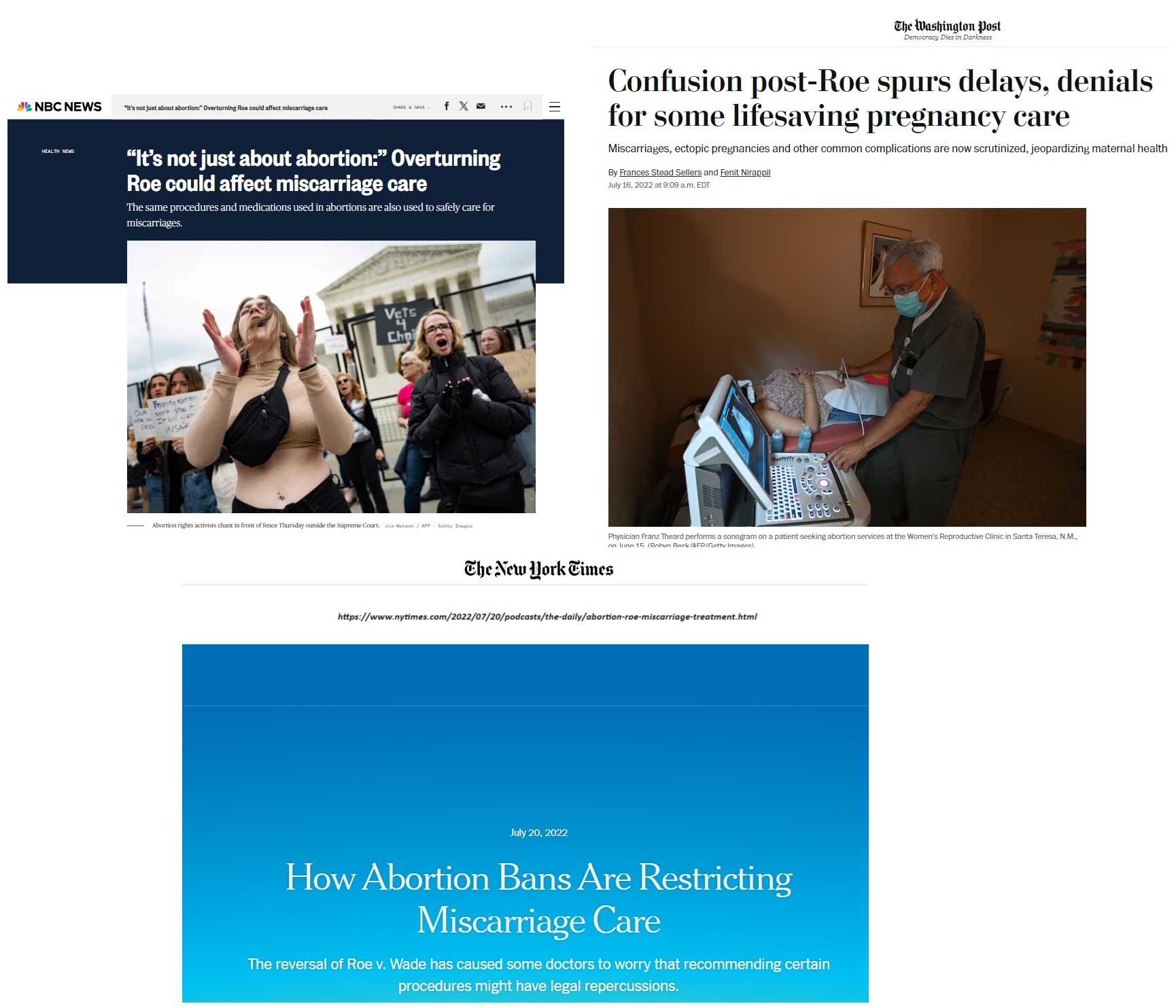
Media Outlets claim confusion around miscarriage care caused by pro-life laws
According to Live Action News’ research, at this time, Planned Parenthood has facilities offering miscarriage care in 11 of the 14 states that have the most pro-life protections in place (Alabama, Arkansas, Idaho, Indiana, Kentucky, Louisiana, Mississippi, Missouri, North Dakota, Oklahoma, South Dakota, Tennessee, Texas, and West Virginia).
Pro-life states where Planned Parenthood provides miscarriage care:
Arkansas
In Arkansas, “Abortion is completely banned with very limited exceptions,” according to the Guttmacher interactive map.
Yet, of the two facilities [Little Rock (see here) and Rogers] operated by Planned Parenthood Great Plains, both provide miscarriage care.
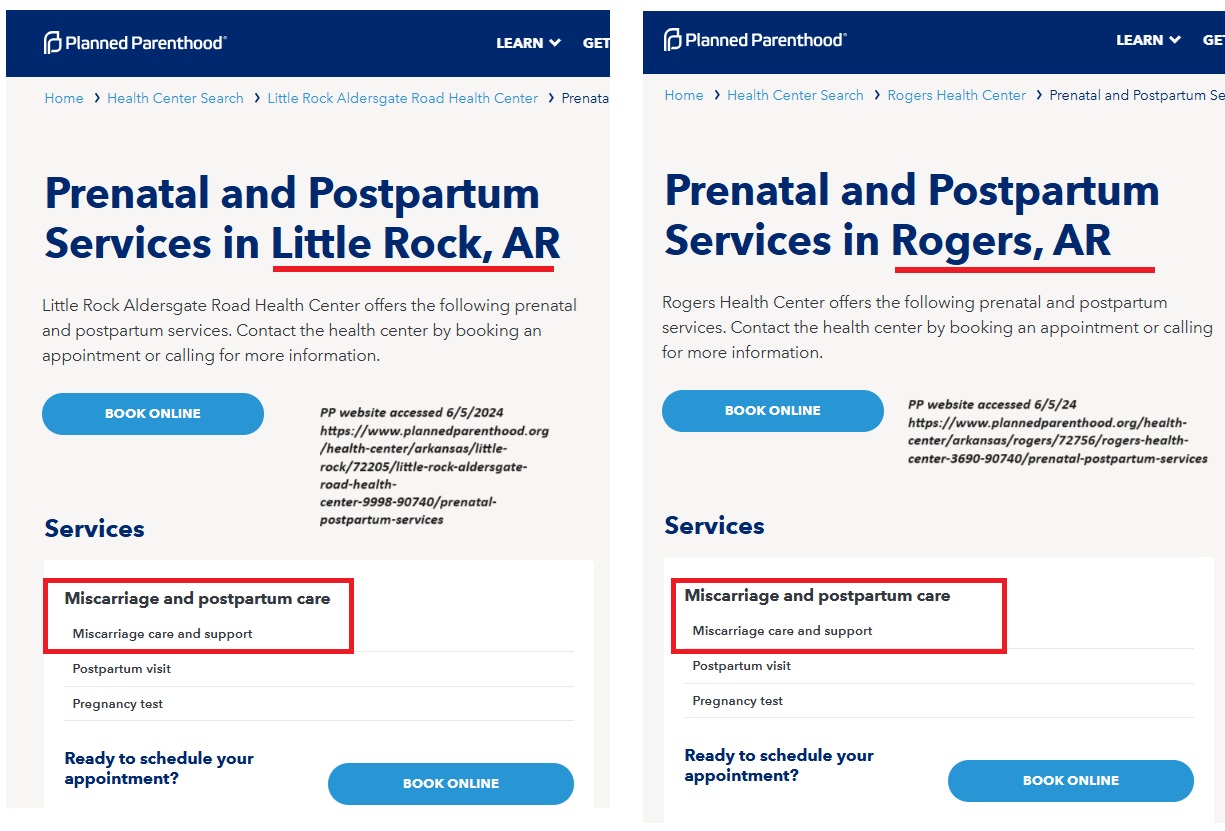
Planned Parenthood Little Rock and Rogers Arkansas both offer Miscarriage Management
Idaho
In Idaho, “Abortion is completely banned with very limited exceptions,” Guttmacher’s interactive map claims.
There are two centers in Idaho operated by Planned Parenthood Great Northwest, Hawaii, Alaska, Indiana, Kentucky, which acknowledges that “Due to state law, abortion is now banned in Idaho.”
Yet, Idaho Planned Parenthood centers in Meridian and Twin Falls both offer miscarriage care.
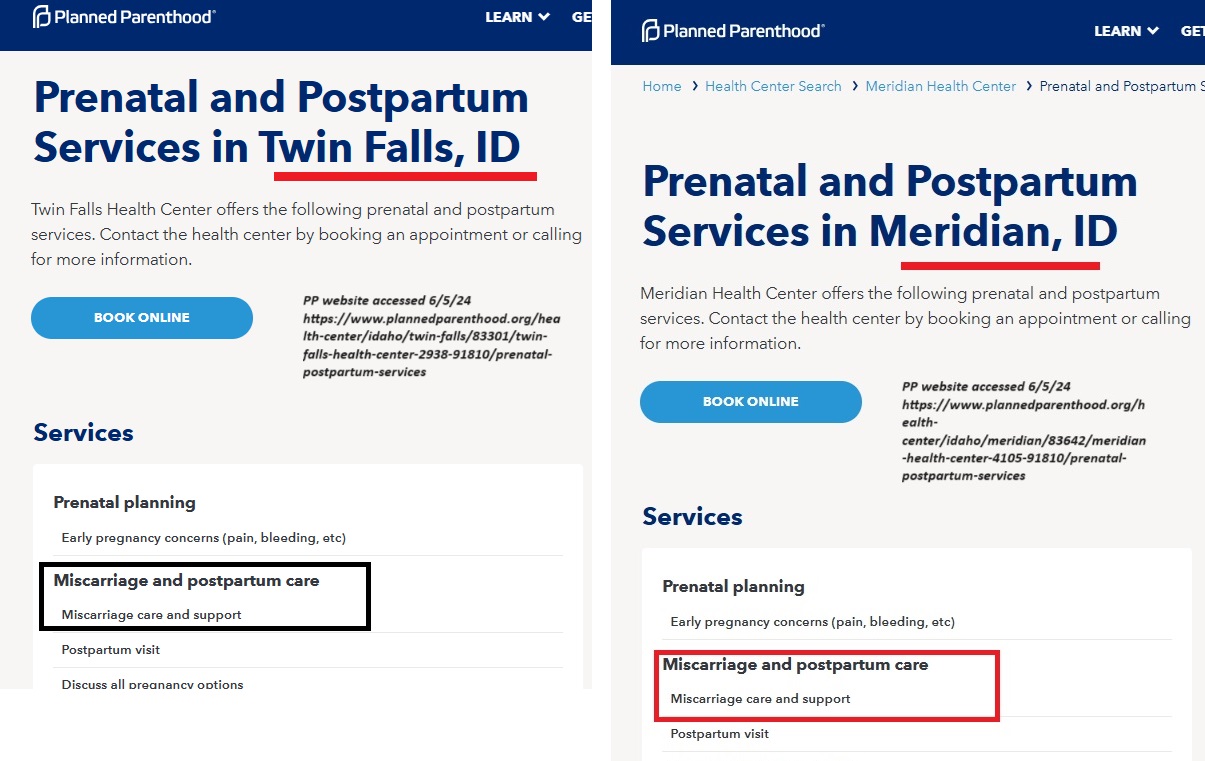
Both Planned Parenthood centers in Idaho offer miscarriage care
Indiana
In Indiana, Planned Parenthood Great Northwest, Hawaii, Alaska, Indiana, Kentucky operates 11 facilities in the state.
These include the Bloomington, Evansville, Fort Wayne, Hammond, Indianapolis (Midtown), Indianapolis (Georgetown), Indianapolis (Southside), Lafayette, Merrillville, Mishawaka, and New Albany Planned Parenthood centers.
Each center offers “Prenatal planning” which includes “Early pregnancy concerns (pain, bleeding, etc),” as well as “Miscarriage care,” though the state has in place protections from abortion for preborn children, according to the Guttmacher interactive map.
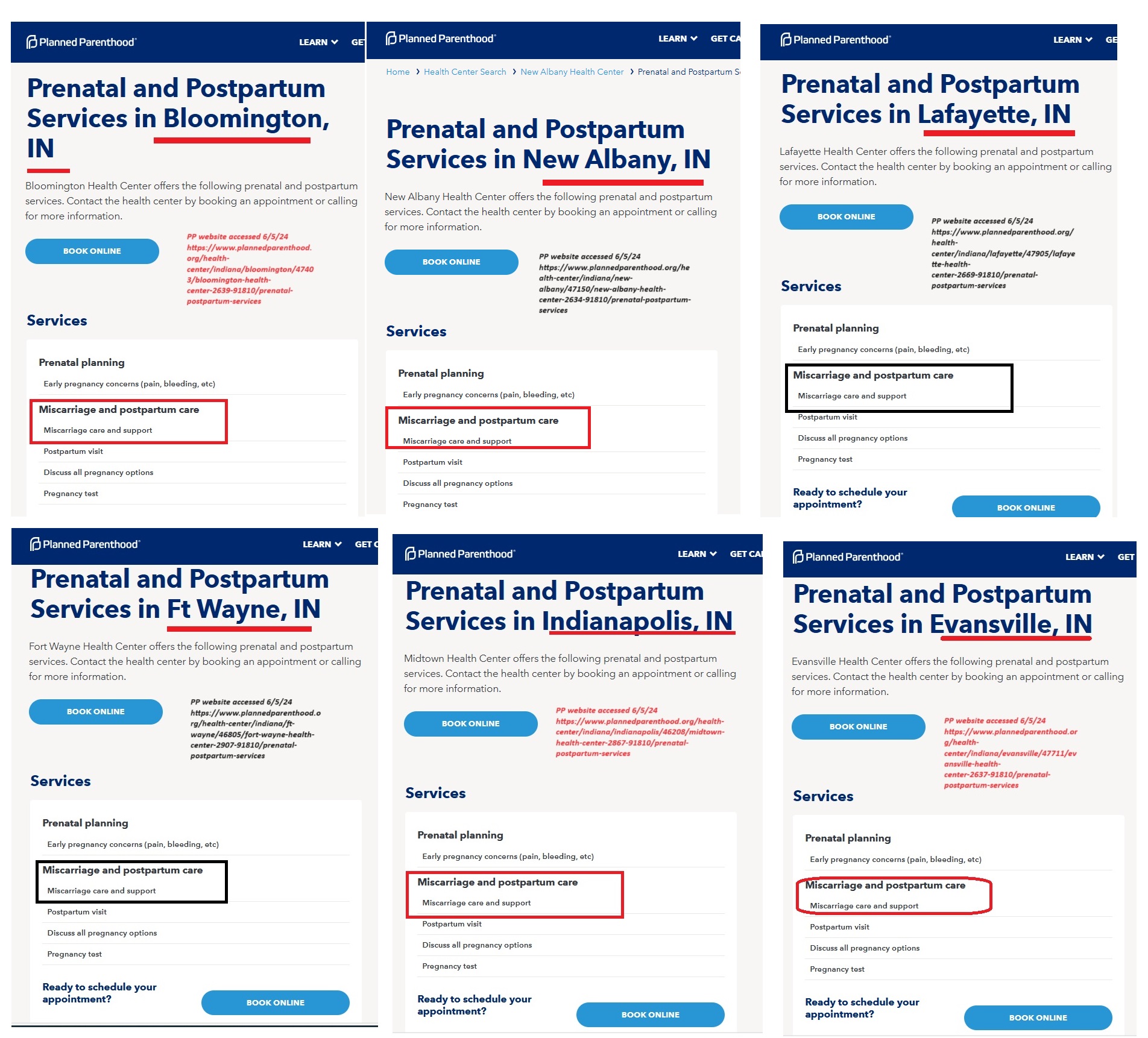
Indiana Planned Parenthood centers offer miscarriage care
Kentucky
Guttmacher’s interactive map claims that in Kentucky, “Abortion is completely banned with very limited exceptions.”
Yet, of the two centers Planned Parenthood operates in the state, both Lexington and Louisville offer “Miscarriage care and support.”
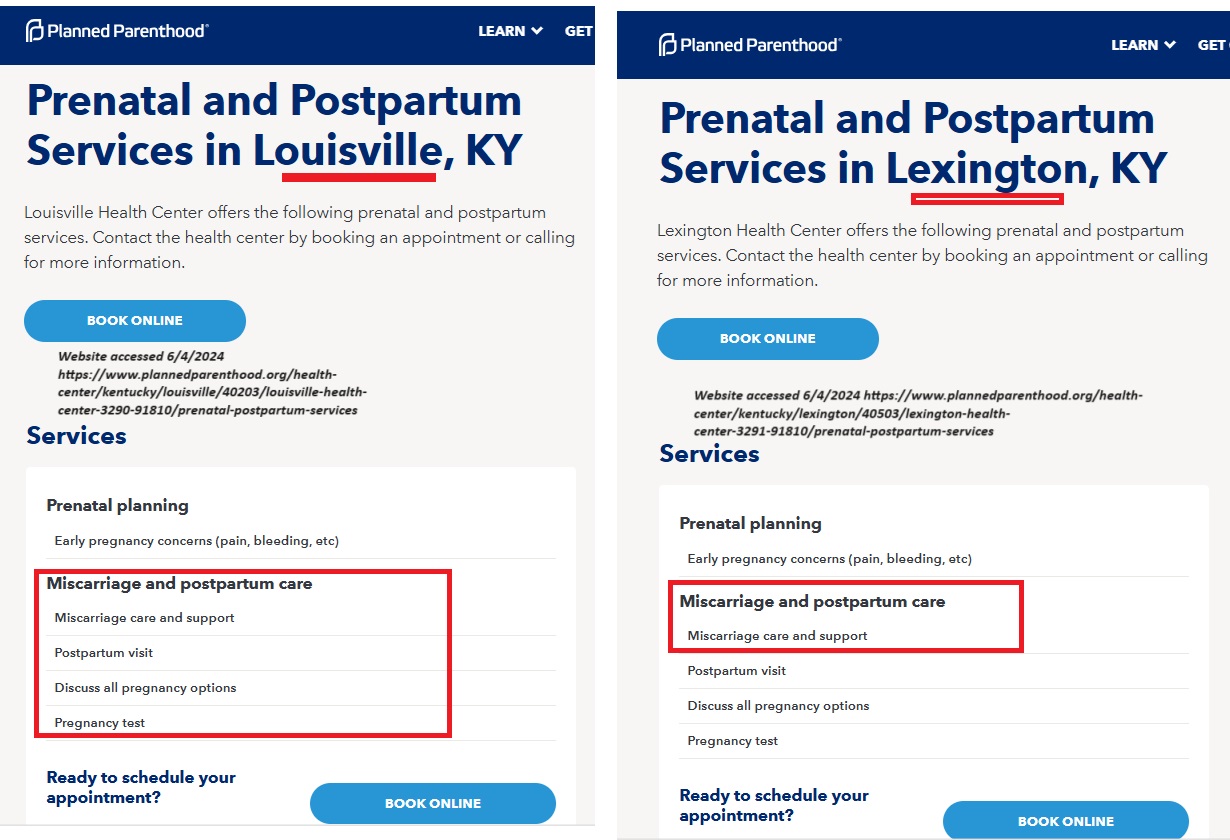
Planned Parenthood centers in Louisville and Lexington Kentucky offer miscarriage care
Louisiana
In Louisiana, Planned Parenthood Gulf Coast (PPGC) operates three centers in the state, but one of those is virtual only.
Planned Parenthood’s Baton Rouge and New Orleans Health Centers both offer miscarriage care, despite Guttmacher’s interactive map claiming that “Abortion is completely banned with very limited exceptions.”
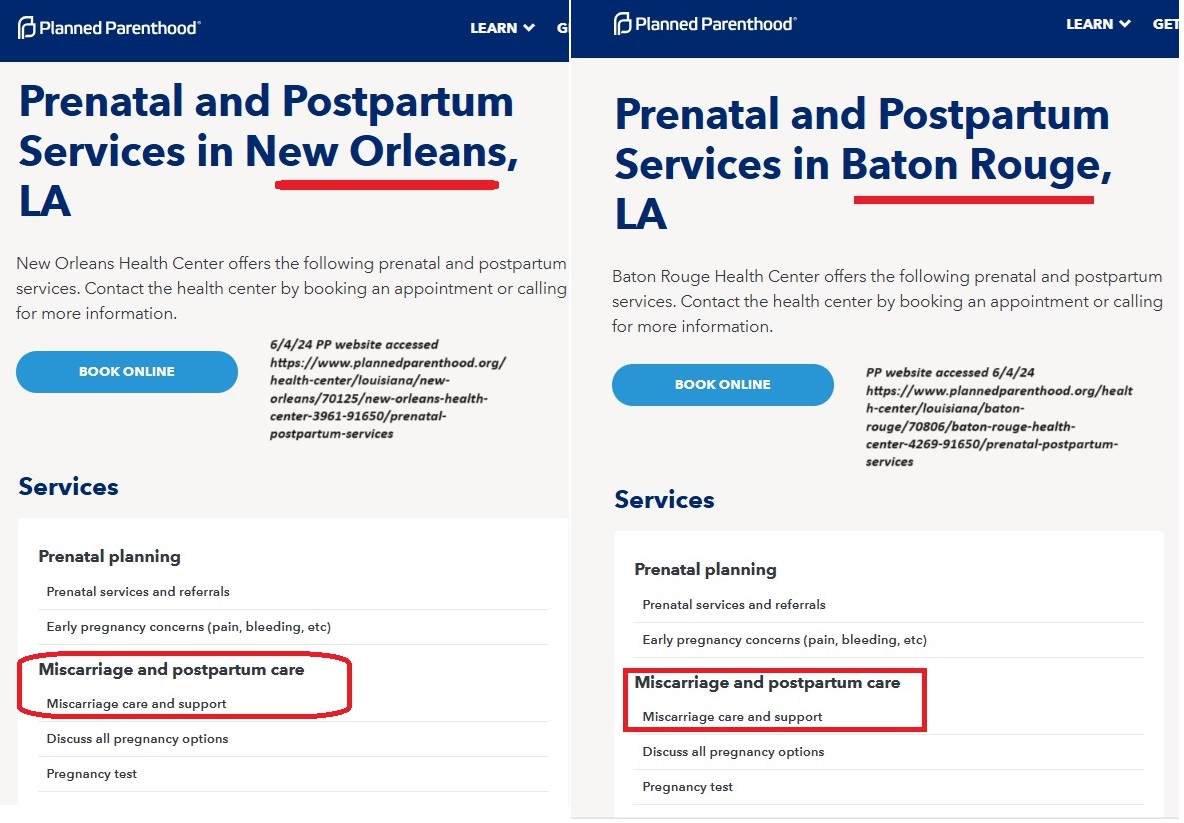
Planned Parenthood Louisiana centers in Baton Rouge and New Orleans offers miscarriage care
Mississippi
Planned Parenthood Southeast operates one facility in Mississippi. That facility, in Hattiesburg, previously offered miscarriage care.
Yet, the Guttmacher interactive map claims that “Abortion is completely banned with very limited exceptions.”
12/1/24 UPDATE: This facility has been PERMANENTLY CLOSED.
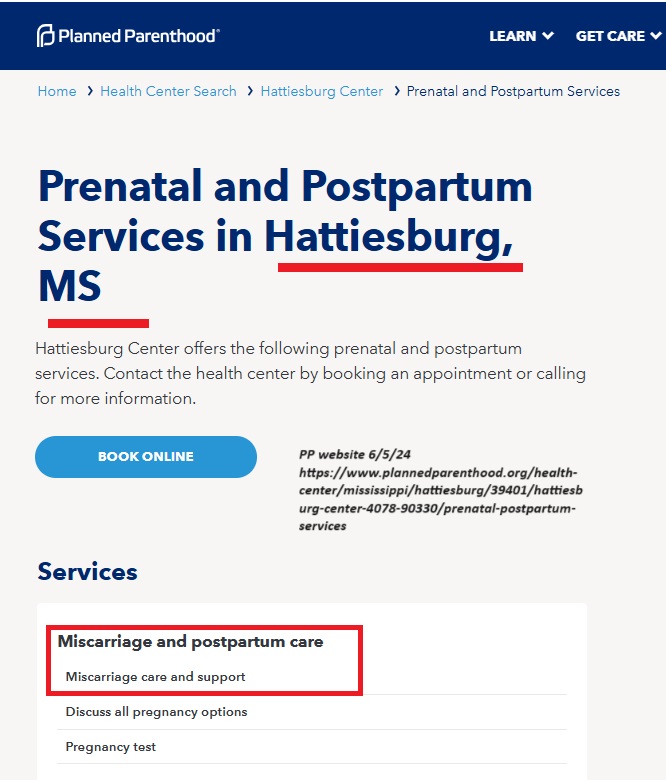
Planned Parenthood center in Hattiesburg, Mississippi offer miscarriage care
Missouri
In Missouri, Planned Parenthood Great Plains operates 12 facilities in the state and at least three of them (Gladstone, Independence, and Kansas City) offer miscarriage care. [UPDATE: The Columbia facility previously advertised miscarriage care, but a 12/1/24 search revealed that this facility no longer advertises this service.]
According to the Guttmacher interactive map, “Abortion is completely banned with very limited exceptions. Missouri requires an ‘affirmative defense,’ meaning a provider has to prove in court that an abortion met the criteria for a legal exception.”
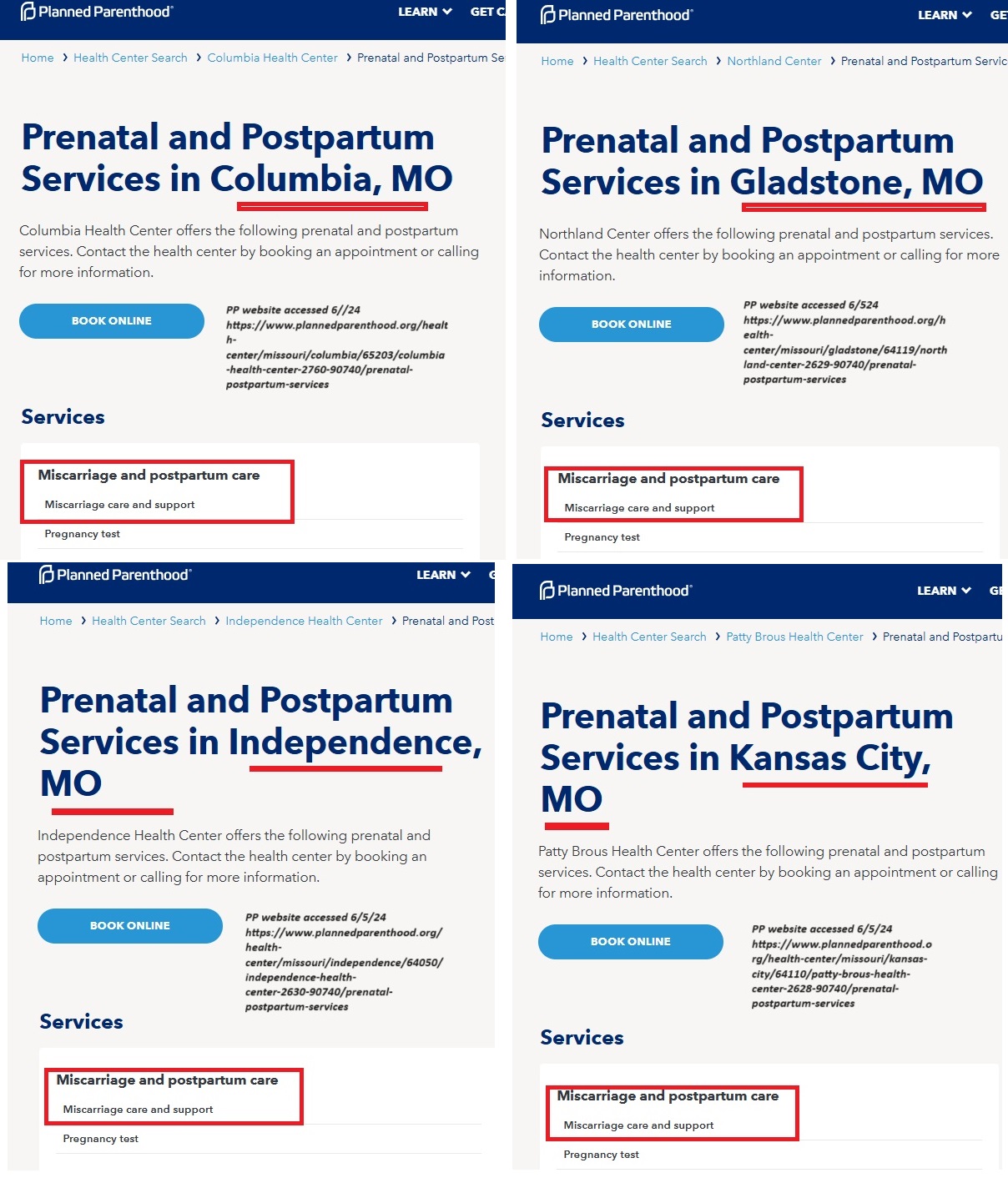
Planned Parenthood facilities in Missouri offer miscarriage care
Oklahoma
Guttmacher’s interactive map claims that “Abortion is completely banned with very limited exceptions” in Oklahoma. Still, of the four facilities Planned Parenthood Great Plains operates in the state, the Tulsa facility provides miscarriage care.
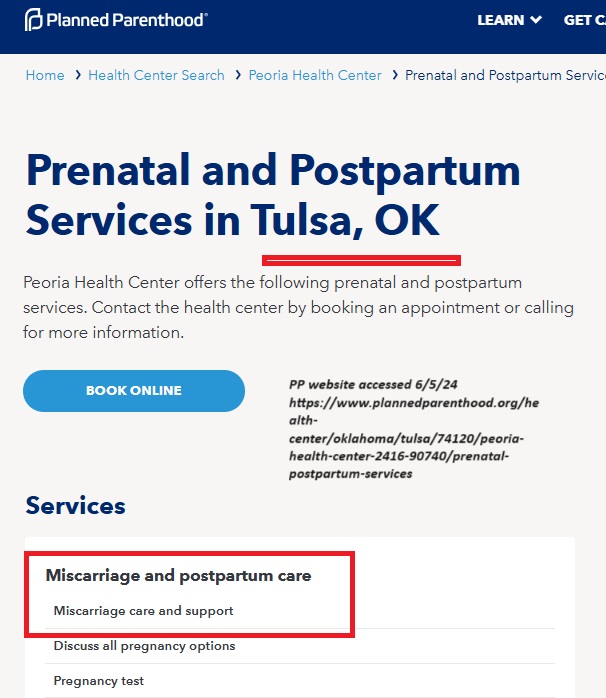
Planned Parenthood Tulsa Oklahoma offers miscarriage care
Tennessee
Planned Parenthood of Tennessee and North Mississippi (PPTNM) claims online that “Due to TN law, PPTNM no longer provides abortion services at our health centers.” This matches the claim on Guttmacher’s interactive map that “Abortion is completely banned with very limited exceptions.”
PPTNM operates four facilities in Tennessee, and three of them, in Memphis [archived link], Memphis (near Summer) [archived link], and Nashville [archived link], offer miscarriage care. [UPDATE, 12/1/24: In June of 2024 when this article was published, all of these centers advertised miscarriage care, as evidenced by the archived links now included; however, as of a 12/1/24 search, these facilities no longer advertise miscarriage care.]
The Knoxville [archived link] Planned Parenthood facility has “paus[ed] services…due to an emergency with our medical provider,” the website claimed. Therefore, it is unclear what services will be offered at this facility in the future. [UPDATE, 12/1/24: This facility REOPENED on Oct. 14, 2024.]
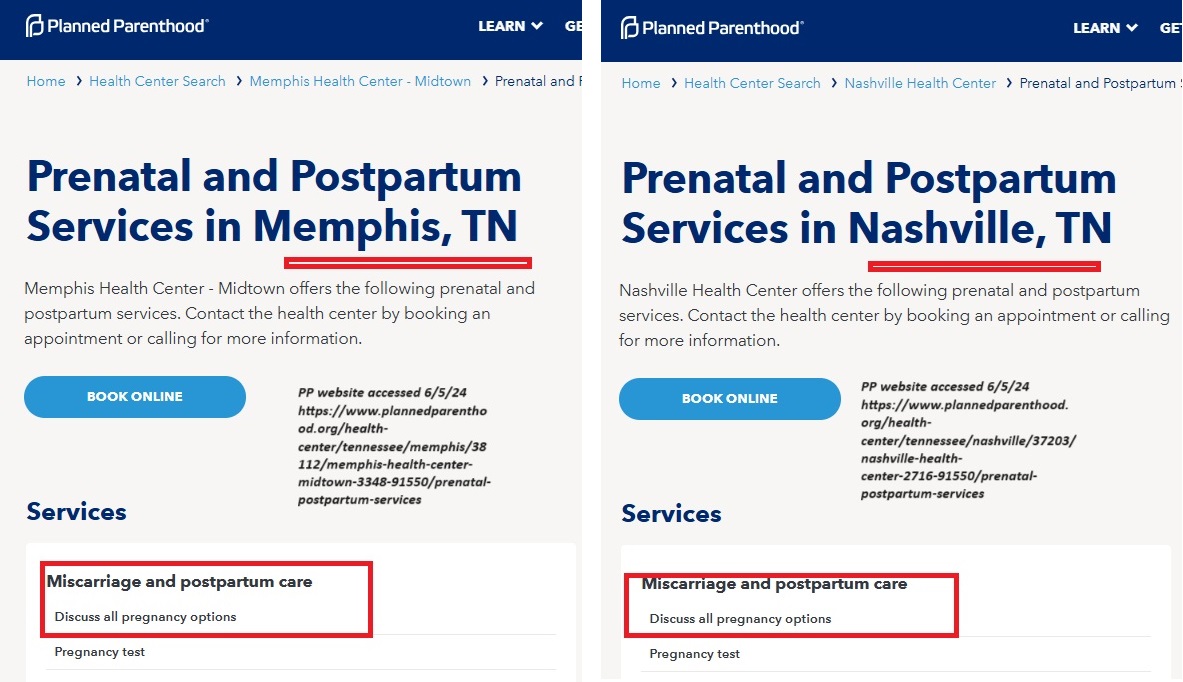
Planned Parenthood centers in Memphis and Nashville Tennessee offer miscarriage care
Texas
Planned Parenthood in Texas operates numerous centers across the state, despite Guttmacher’s interactive map claiming that in Texas “Abortion is completely banned with very limited exceptions.”
Affiliate Planned Parenthood of Greater Texas (PPGT) states online that “Due to the U.S. Supreme Court opinion overturning Roe vs. Wade, abortion services are currently not available at Planned Parenthood of Greater Texas health centers, and may be impacted in other states.”
With clear pro-life laws in place, the PPGT affiliate still offers miscarriage care in Addison, Arlington, Austin (Central), Austin (Downtown), Austin (North), Bedford, Cedar Hill, Dallas (North), Denton, El Paso Health Resource Center, Fort Worth (Southeast), Fort Worth (Southwest), Lubbock, Mesquite, Paris, Plano, Tyler, and Waco.
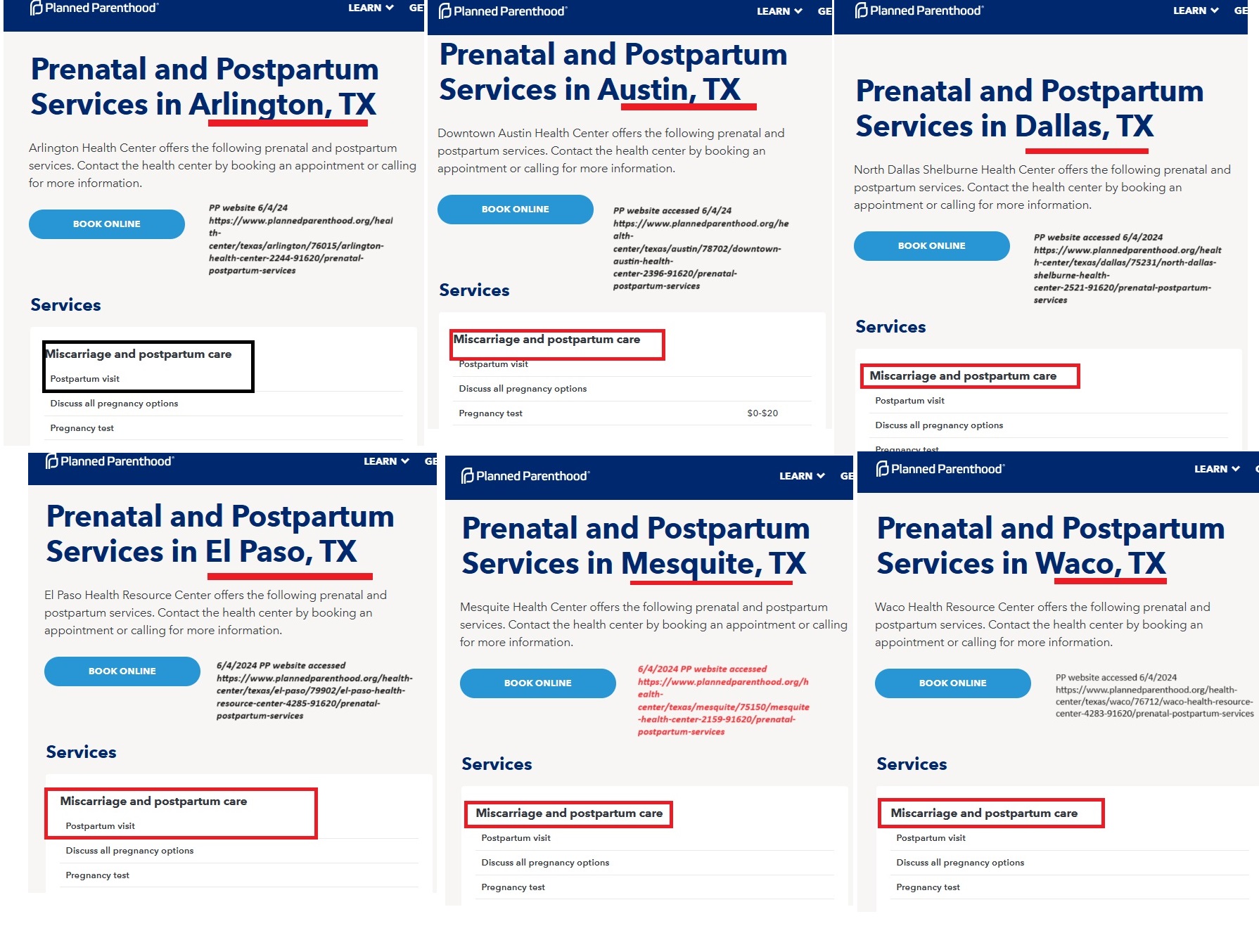
Selected Planned Parenthood centers in Texas offer miscarriage care
The Planned Parenthood Gulf Coast (PPGC) affiliate operates six centers in the Greater Houston area [Texas] and two in Louisiana, according to their website. Both states have restrictive abortion laws, according to Guttmacher’s abortion map.
Yet in Texas, PPGC’s Houston [archived link], Houston (Northwest) [archived link], Houston (Southwest) [archived link], Houston (Northville) [archived link], Spring [archived link], and Stafford [archived link] centers all offer miscarriage care.
[UPDATE, 12/1/24: In June 2024 when this article was published, these centers all advertised miscarriage care; however, a search on 12/1/24 reveals they no longer offer this service.
However, Planned Parenthood Gulf Coast, which oversees the Houston facilities, currently clearly tells women online, “If you’re experiencing pregnancy complications or think you may be having a miscarriage, our providers can evaluate you and provide care and/or information. If we can’t provide your care directly in our health center, we can connect you to a trusted community partner who can.”
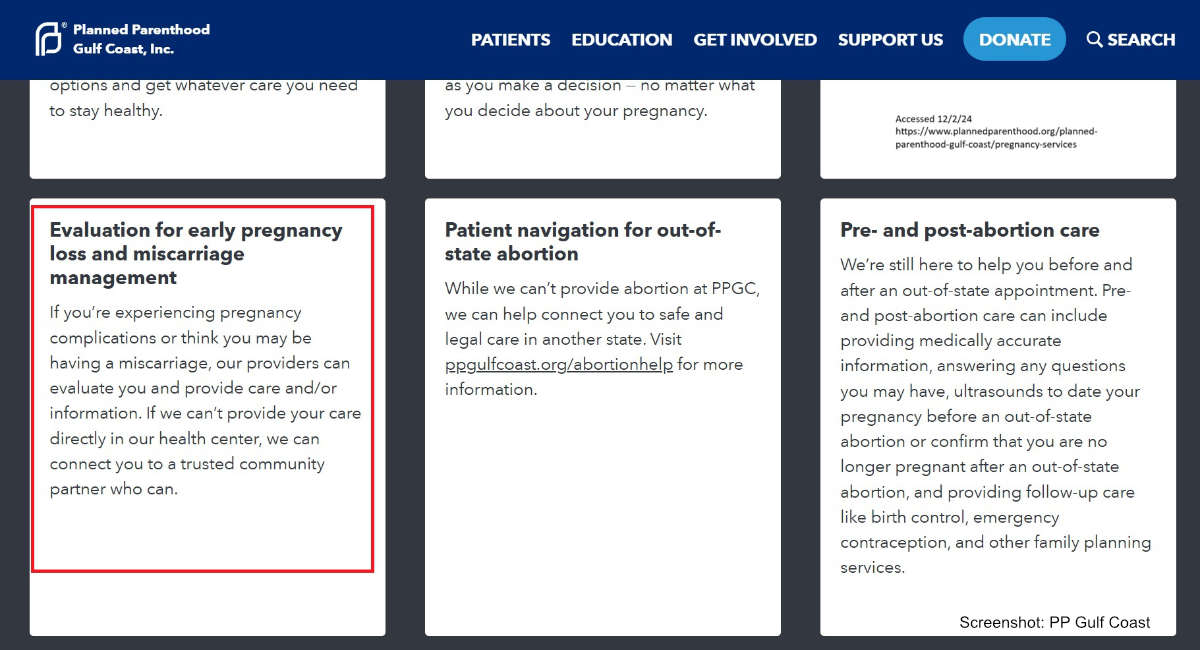
PP Gulf Coast miscarriage management evaluation
In a separate location on the same page under the question, “Can you help me if I’m having a miscarriage?” Planned Parenthood writes, “Depending on your symptoms and the stage of your pregnancy, we may be able to help you in our health center. We currently provide evaluation for early pregnancy loss and miscarriage management in our New Orleans and Baton Rouge health centers. If we can’t provide your care directly, we can connect you to a trusted community partner who can.”
Archived pages of the affiliate website shows this same information dating back to September of 2023; however a “tell us your story” archived form on the website dating back to July 2023 indicates the service has been available for some time. The form currently states, “Whether it’s affordable birth control or the right to safe and legal abortion, tell us why these services matter to you. Sharing your story will help ensure that Planned Parenthood will continue to be there for the individuals who depend on us for everything from birth control, HIV and STI testing, cancer screenings, miscarriage care, gender-affirming hormone therapy, comprehensive sexuality education to legislative advocacy and more.”]
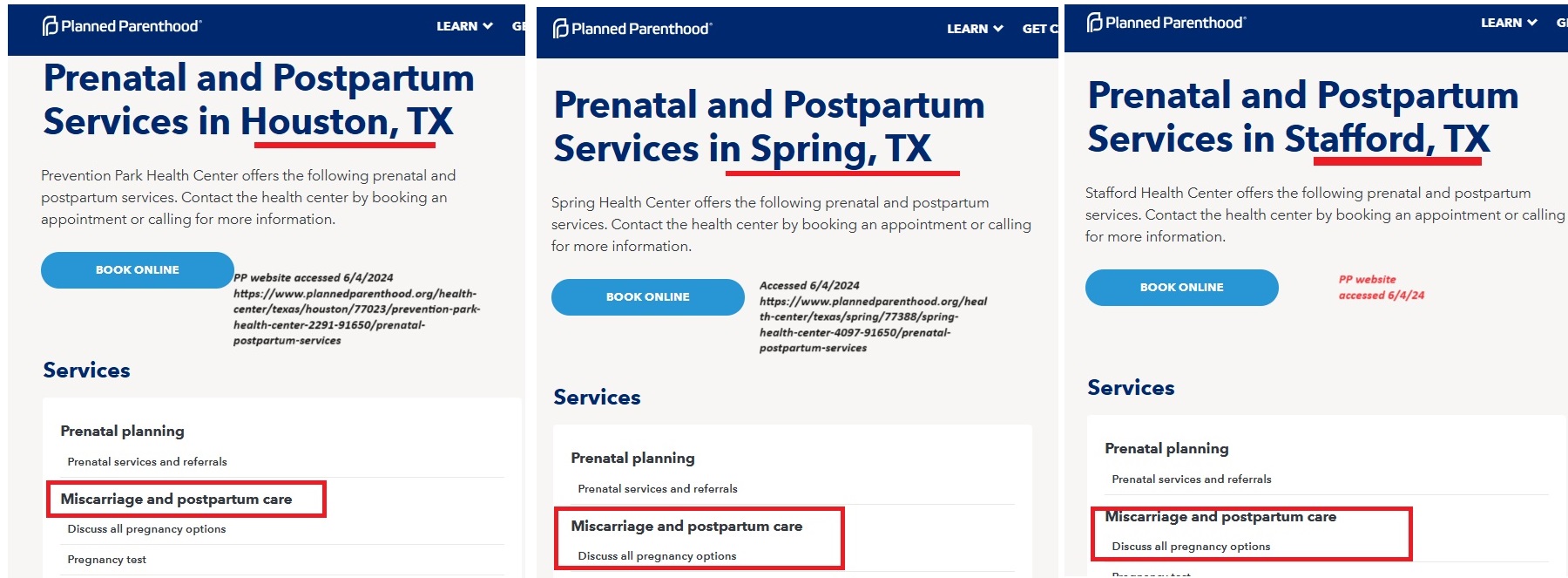
Planned Parenthood centers in Central Texas offers miscarriage care
Planned Parenthood South Texas (PPST) operates a center in San Antonio and two centers in the Rio Grande Valley (Harlingen and Brownsville), according to their website.
All of these centers — Brownsville, Harlingen, San Antonio (Richland Hills), San Antonio (Northeast), San Antonio (Southeast), San Antonio (South Medical Center) — offer miscarriage care.
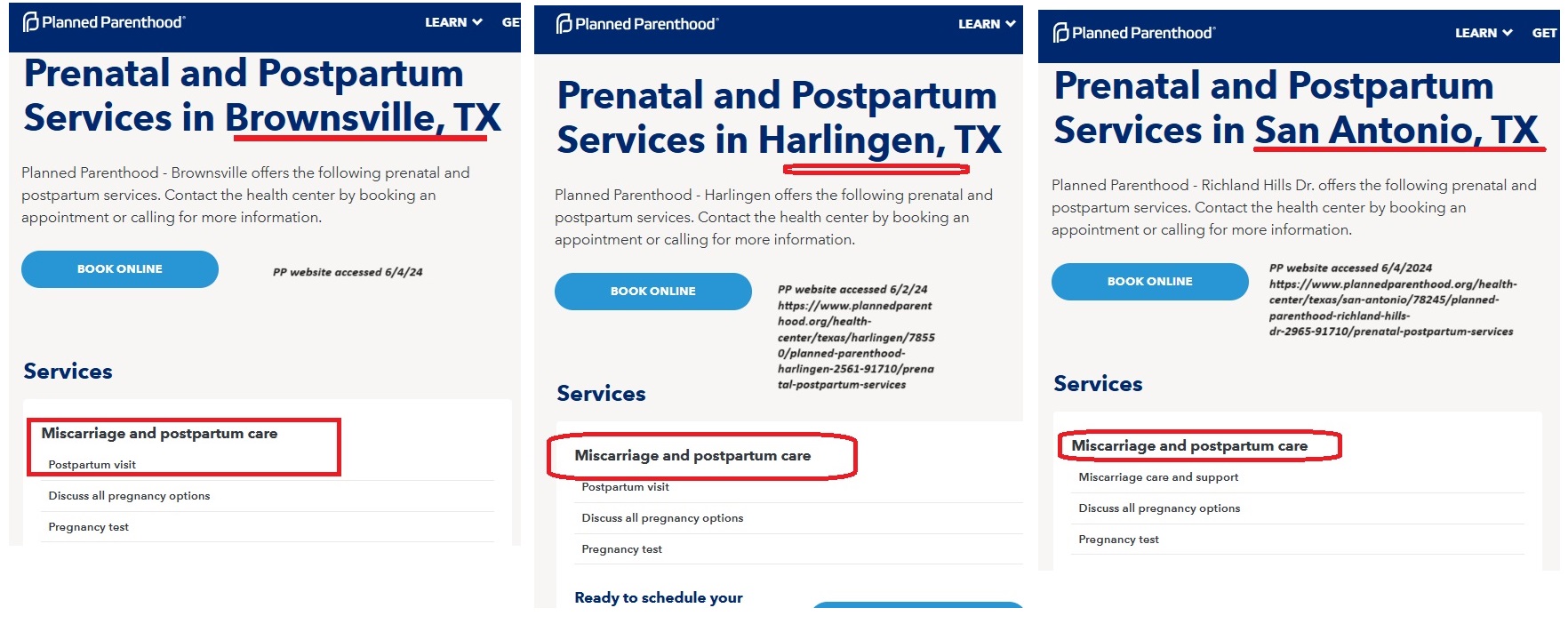
Planned Parenthood centers in South offer miscarriage care
West Virginia
Planned Parenthood South Atlantic operates one facility in West Virginia. That Vienna facility offers miscarriage care, despite the Guttmacher interactive map claiming that “Abortion is completely banned with very limited exceptions” in the state.
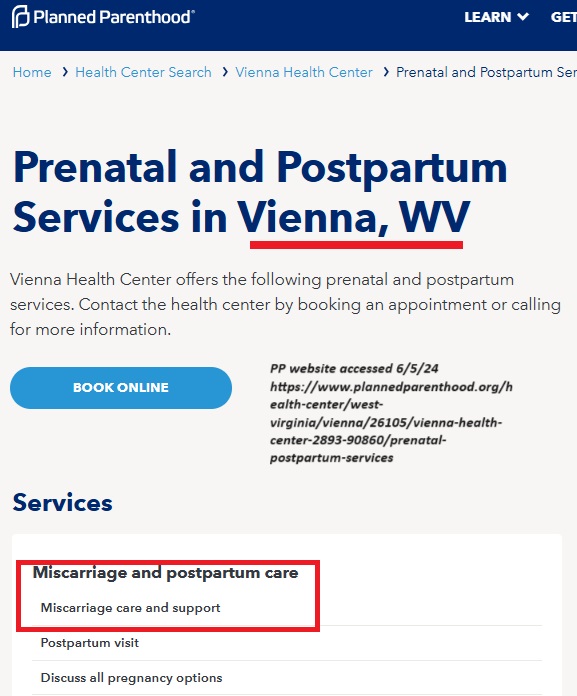
Planned Parenthood in Vienna West Virginia offers miscarriage care
Pro-life states where Planned Parenthood does not provide miscarriage care:
Alabama
Planned Parenthood Southeast operates two centers [UPDATE, 12/1/24: now one center] in Alabama; according to the Guttmacher Institute’s interactive map, “Abortion is completely banned with very limited exceptions.”
It does not appear that either facility offers miscarriage care in the state.
North Dakota
In North Dakota, Guttmacher’s interactive map claims, “Abortion is completely banned with very limited exceptions” in the state. There are currently no Planned Parenthood facilities in North Dakota, according to the organization’s website.
South Dakota
In South Dakota, “Abortion is completely banned with very limited exceptions,” according to the Guttmacher interactive map. While Planned Parenthood operates two facilities in South Dakota, neither of them appear to publicly offer miscarriage care.
Miscarriage Care at Planned Parenthood
Planned Parenthood does not specify what constitutes “miscarriage care,” which is a relatively new service category for Planned Parenthood.
Live Action News previously documented that miscarriage services at Planned Parenthood have risen nearly 36% (35.85%) from 2,653 in 2021-22 to 3,604 in 2022-23, according to the organization’s national reports.
This number represents services provided from October 1, 2021 to September 30, 2022, just after the Dobbs v. Jackson Women’s Health Organization Supreme Court decision overturned Roe v. Wade in June of 2022.
Data since then has not yet been published.
How Planned Parenthood Defines Miscarriage
According to Planned Parenthood’s website, “Miscarriage is when you lose a pregnancy before the 20th week of pregnancy. The medical term for miscarriage is ‘spontaneous abortion.’”
“Lots of people experience this kind of pregnancy loss. In fact, 10–20% of pregnancies end in miscarriage,” the abortion corporation claimed.
The website details: What are the treatments for miscarriage?
There are 3 ways to treat a miscarriage:
- Just wait and see if the pregnancy tissue passes through the vagina on its own. How long this takes varies — it can take up to a week or more, depending on your situation.
- Use medicines with the support of a nurse or doctor like misoprostol and/or mifepristone to make the uterus contract and pass the pregnancy tissue. Medicines often work faster than the wait-and-see approach.
- Have a suction procedure, where a nurse or doctor puts a thin plastic tube in your uterus and removes the pregnancy tissue with gentle suction. This is the quickest way to complete a miscarriage and works the best. It’s also similar to a method used for abortion.
And a separate page claims pregnant women “may or may not” see the “embryo or fetus during a miscarriage.”
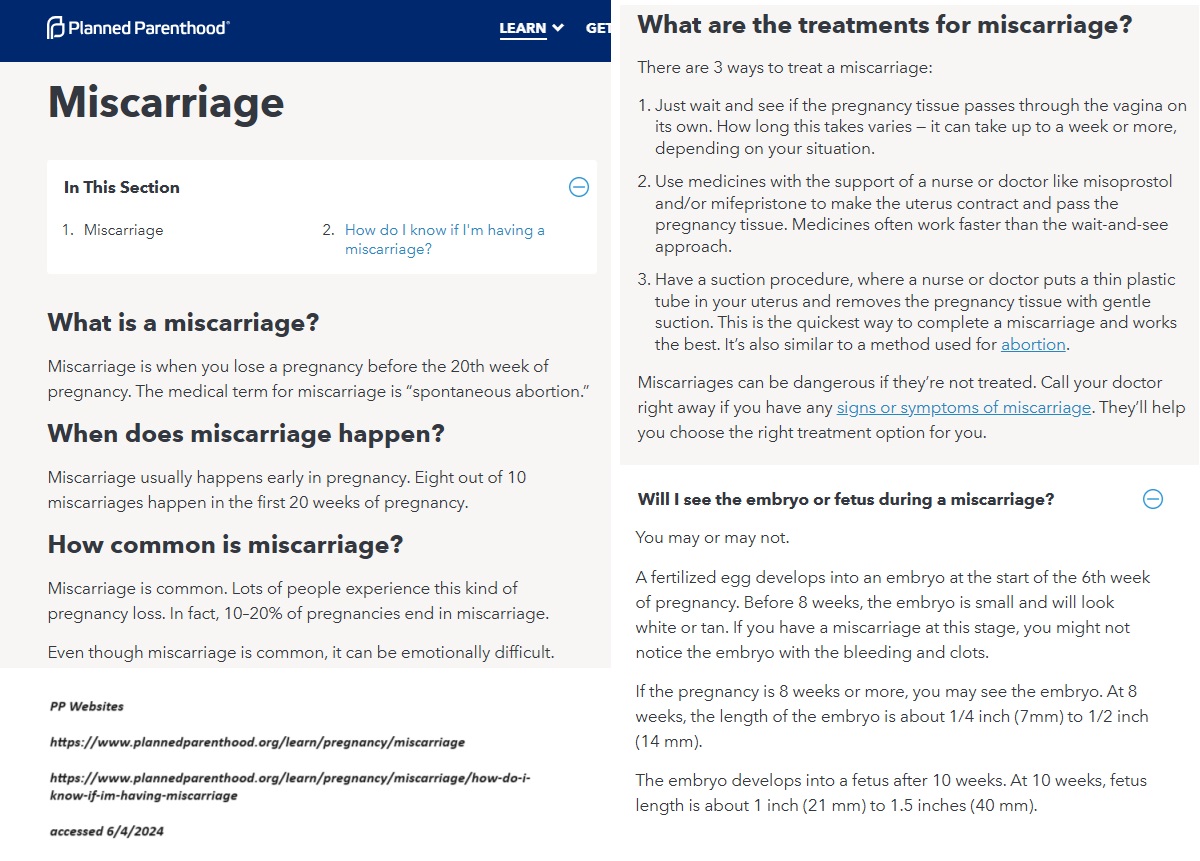
Planned Parenthood website what is miscarriage accessed 60424
Planned Parenthood Plays Into Confusion
Even though Planned Parenthood offers miscarriage services, the corporation has played into the fear surrounding miscarriage care, because manipulating public perception of pro-life laws benefits their ability to commit abortions.
Case in point: a recent Los Angeles Times report cited Sue Dunlap, president and CEO of Planned Parenthood Los Angeles, as claiming that her facility has “seen multiple patients travel from out of state for miscarriage care.”
“In at least one example, a patient flew to Los Angeles because she was unsure of the status of her pregnancy and felt unable to access the care she needed in her local community,” she claimed. “Ultimately, patients are traveling hundreds of miles for care that theoretically should be permissible in their home state but that, in practice, becomes impossible to access due to fear and legal confusion.”
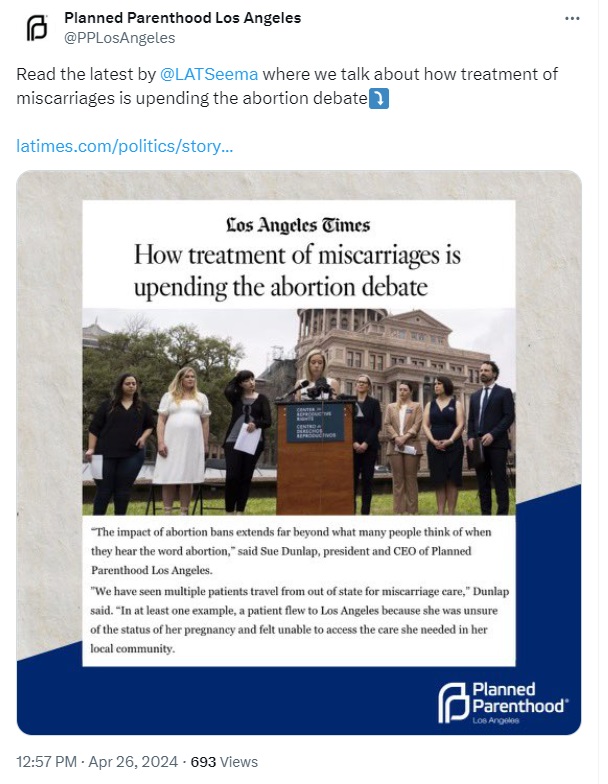
PPLA Twitter X on miscarriage care
Ironically, the media outlet failed to ask Dunlap why these women are not being referred to their own Planned Parenthood facilities for miscarriage care services, since it is clear that the majority offer them.
Editor’s Note, 12/1/24: This article has been updated with more recent information and archived links.







